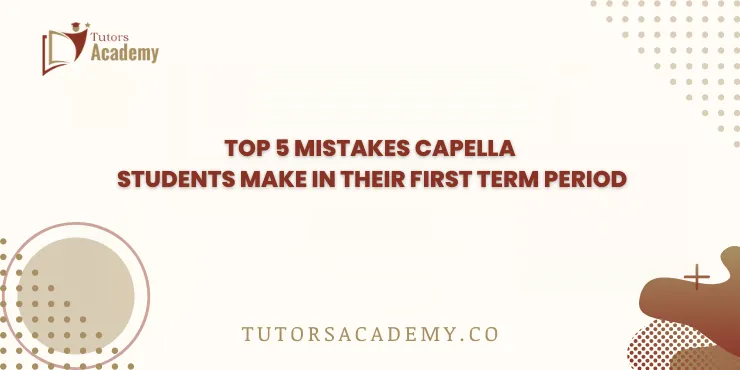
Top 5 Mistakes Capella Students Make in Their First Term Period
Enrolling at Capella University is a thrilling first step for students toward achieving their academic and professional aims. It’s normal for new learners to fall victim to a few classic mistakes during their hectic first semester. Don’t worry, though! You may proactively steer clear of these possible blunders and position yourself for a solid, prosperous start by being aware of them. So, read this post till the end to understand how to get rid of these problems.
Most Common Mistakes of Capella Students in Their First Term
The first term is a crucial time for Capella learning, and almost all students make some mistakes during this time period. But you know what? You are not required to! We’ve listed the top five mistakes that Capella beginners experience and provided you with easy, stress-free strategies to avoid them.
1. Neglecting the Duration of Time Required
One of Capella’s primary advantages for its students is the adaptability of its course material. Sometimes you can study whenever and wherever it works best for you. This adaptability, nevertheless, will sometimes end in the harmful misunderstanding that a shorter period is needed.
Usually, first-time Capella students underestimate the number of hours they truly require each week to engage with the course material, complete assignments, participate in discussions, and comprehend competencies. Instead of treating it as a major academic obligation, they can treat it as an informal activity.
The following are the Ways to Prevents This Problem:
- Set up certain, essential periods for studying each week, just like when applying for a job or a regular class.
- Please note that, depending on the requirements and prior knowledge, a 3-credit course may require nine to twelve hours of commitment per week, or even more.
- Inform the people who support you about your academic obligations so they are aware of the importance of setting time for study sessions.
2. Not Making Good Use of University Resources
From educational writing to career services, Capella University has an abundance of resources to help you with every step of your education. Nevertheless, a large number of new students in the first term are generally afraid to use these tools or are not aware of them.
Having issues with writing, research, time management, or technology without voicing them when there is readily available professional help. This can lead to feelings of isolation, discontent, and lower academic performance.
How to stay away from it:
- Examine the Capella University: Take your time exploring your course room and the Capella site. Get acquainted with the connections to the Library, Academic Assistance, Technical Services, and Writing Center.
- Do not hesitate to ask: Get help if you’re confused about how to organize an assignment, cite a source, or even use software! This is the purpose of these resources.
- Take part in seminars and orientations: Attend any webinars or first-term meetings that highlight the services accessible to Capella students.
3. Failing to Interact with Teachers and Students
Online learning at Capella is not alone, even though it may feel that way at times. Your Capella professors are an invaluable source of shared knowledge and understanding, and your faculty members are committed to your education and are specialists in their professions.
Believing that online learning is a one-way track where you just turn in assignments without taking part in conversations or contacting teachers for assistance or explanation is the major problem.
To avoid this, posting the bare minimum is not enough. Respond intelligently to the comments of colleagues and offer insightful commentary. Additionally, email your instructor if you have difficulty understanding a concept, have queries regarding an assignment, or are having trouble. Their purpose is to help you.
4. Not doing Capella Assignments on Time
Capella online courses frequently have flexible deadlines for their assignments. This adaptability may be advantageous or disadvantageous for Capella’s students. Although they offer flexibility, they may also promote tardiness, leading to rushed work and increased stress.
The issue is delaying crucial tasks till the very last minute, which leads to hastily written papers, incomplete projects, and missed deadlines.
To Avoid This:
- Divide the a Capella Assignment into smaller, more doable steps as soon as it is presented. Establish brief deadlines for every phase.
- Make a visual schedule of all your due dates for the term.
- Try to finish assignments using enough time to go over the assignment carefully and make any necessary changes before sending it in.
5. Lack of Knowledge of Capella’s Competency-Based Model
One of Capella’s main differentiators is its distinctive competency-based education paradigm, which may deviate from conventional university structures. Its concentration on showcasing certain abilities and knowledge can occasionally be difficult for new students to adjust to.
concentrating only on “maintain a good grade” instead of genuinely comprehending and proving that they have mastered the course competencies. This may result in a superficial approach to education.
To stay away from this problem:
- Pay extra attention to the particular competencies that are expected to be attained for every class and assignment.
- If you have no idea of how an assignment relates to a certain competency, request your instructor for confirmation.
Visit Tutors Academy for complete guidance and information about the Capella FlexPath program.
FAQ's
Answer 1: Delaying in assignments, avoiding interaction with instructors and other students, ignoring the time dedication, ignoring university resources, and misinterpreting the competency-based paradigm are the common mistakes.
Answer 2: It is best to treat your full-time Capella degree as working part-time that requires between 25 and 35 hours each week.
Answer 3: You can get outlines, initial drafts, and citations for free from the Capella Writing Center.
Answer 4: Before the deadline, post your first comment early in the week and then come back to interact with and respond to peers.
Answer 5: To avoid last-minute nervousness, divide major assignments into smaller pieces and set prior mini-deadlines.
